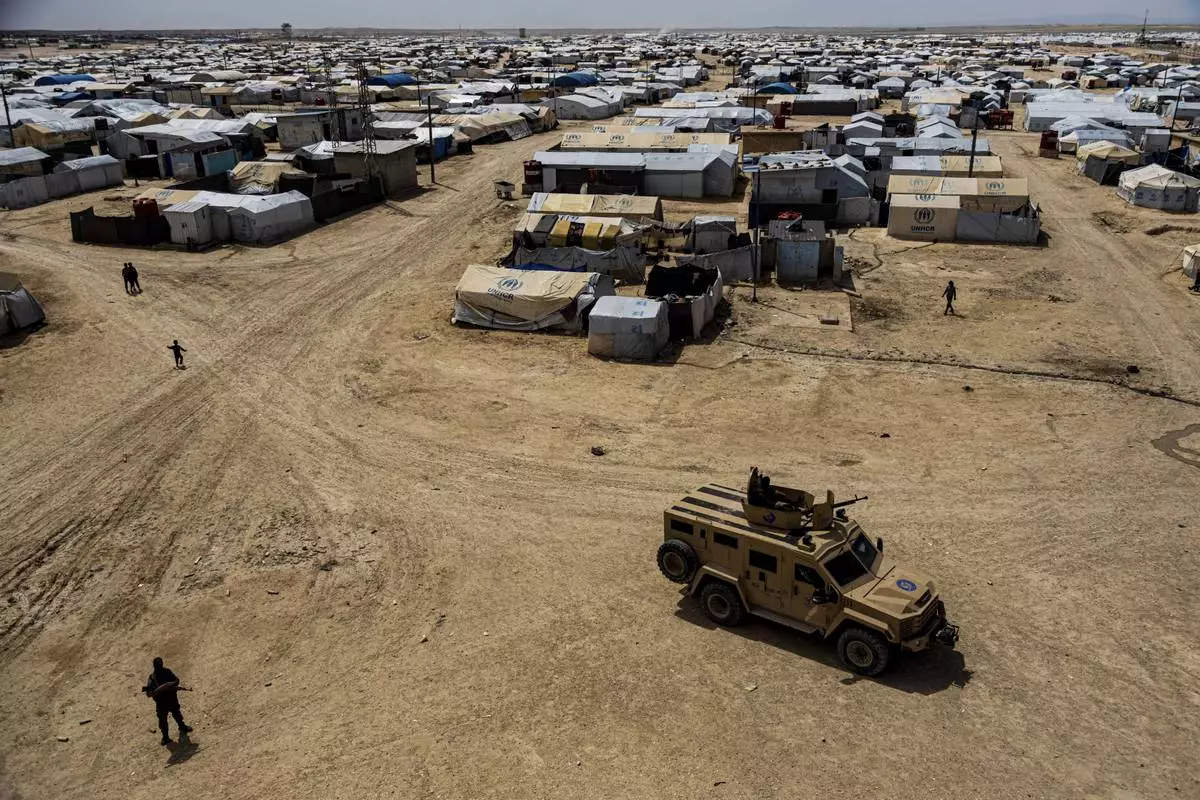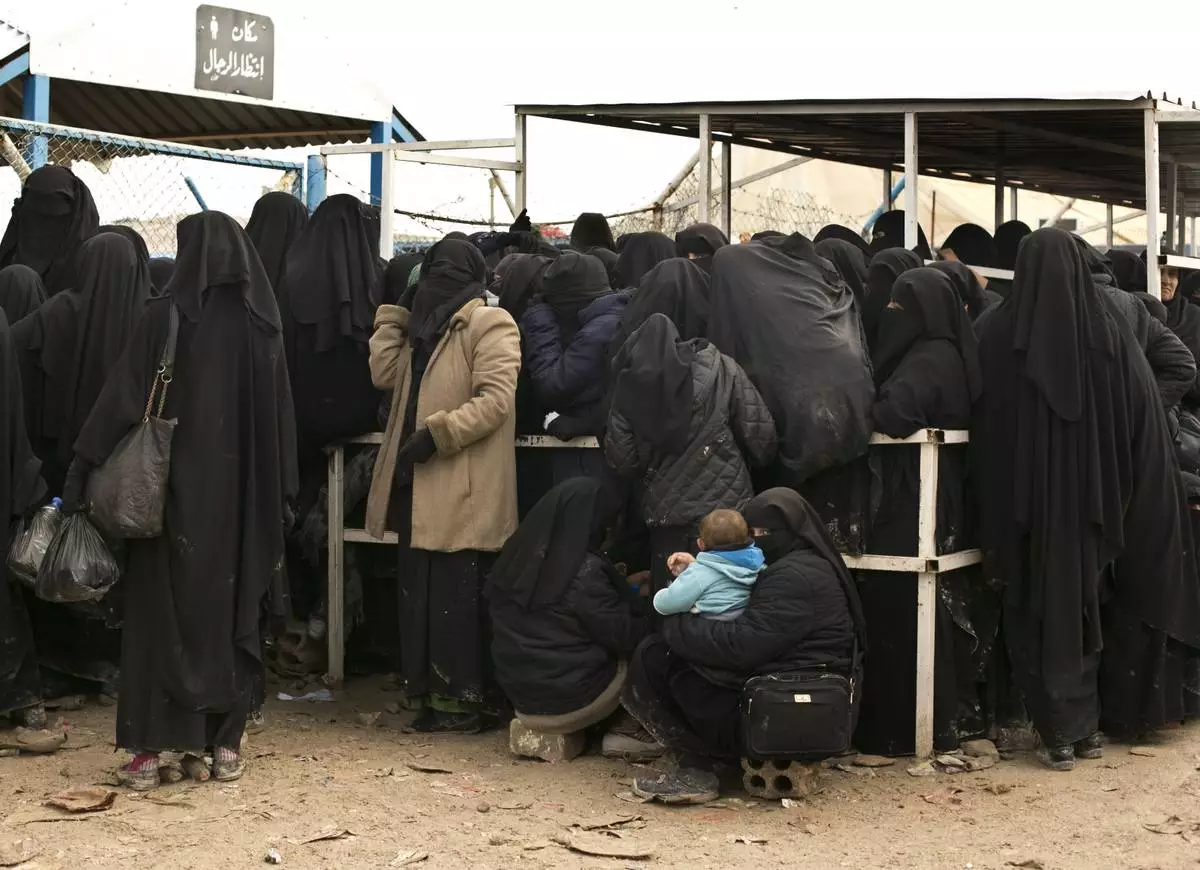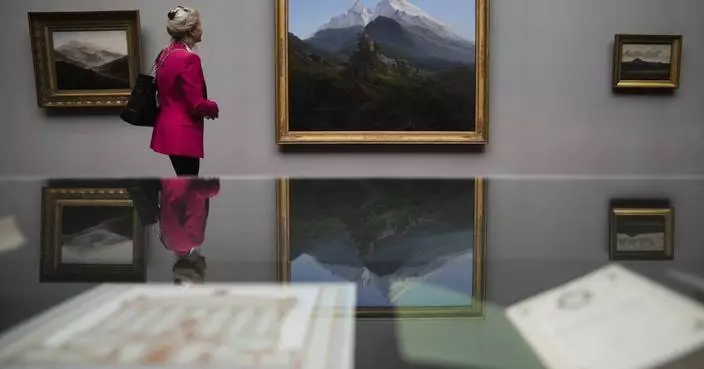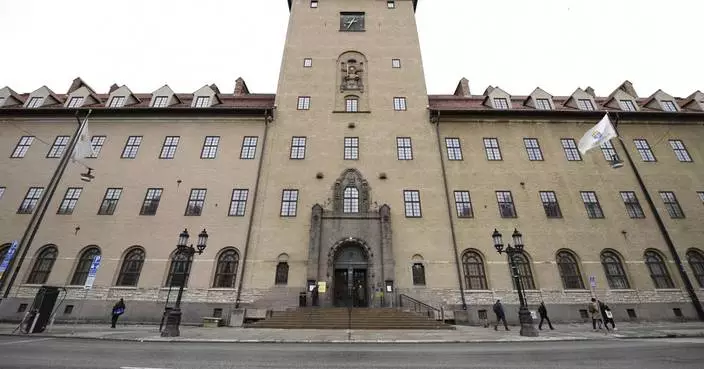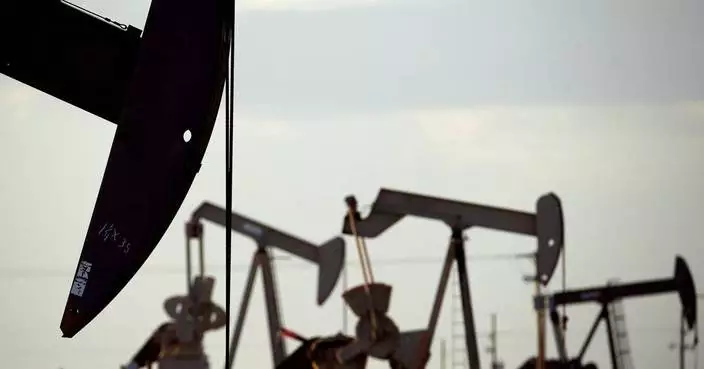A team of inspectors from the international chemical weapons watchdog was on its way to Syria on Thursday to begin an investigation into a suspected chemical weapons attack near the capital that has brought the war-torn country to the brink of a wider conflict, amid Western threats of retaliation and Russian warnings of the potential for "a dangerous escalation."
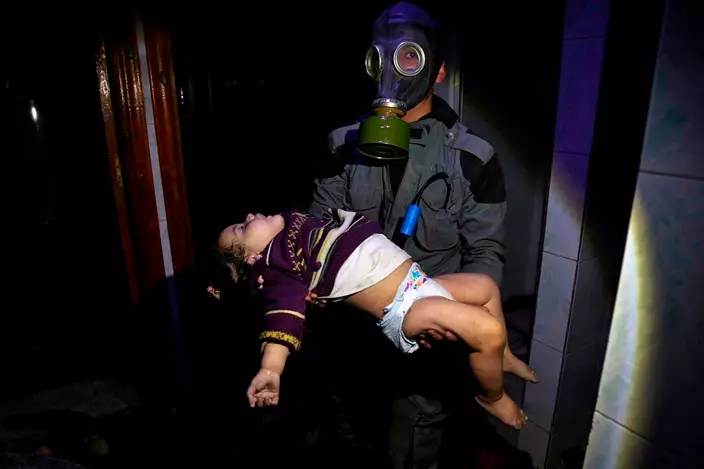
FILE - EDS NOTE: GRAPHIC CONTENT - This Sunday, April. 8, 2018 file image released by the Syrian Civil Defense White Helmets, shows a rescue worker carrying a child following an alleged chemical weapons attack in the rebel-held town of Douma, near Damascus, Syria. With the Middle East on edge and many fearing inadvertent triggering of regional war, it is easy to forget that two weeks ago Trump shocked advisers in declaring an intention to withdraw troops from Syria. Now, apparently angered by a suspected chemical attack, Trump is threatening imminent military strikes against the Syrian government forces he blames and rattling a saber at Syria’s patron Russia. (Syrian Civil Defense White Helmets via AP, File)
The fact-finding mission from the Organization for the Prohibition of Chemical Weapons was expected to head to Douma, where the suspected attack took place and where Russia said rebels had now capitulated to government control. The Syrian government said it would facilitate the mission's investigation, which was to begin Saturday.
Syria and its ally, Russia, deny any such attack, which activists say killed more than 43 people last weekend.
Speaking at the United Nations on Thursday, Russia's U.N. ambassador, Vassily Nebenzia, said the top priority had to be to avert a wider war, and he didn't rule out the possibility of a U.S.-Russia conflict. Speaking to reporters after a closed emergency meeting of the U.N. Security Council, Nebenzia said Russia was very concerned with "the dangerous escalation" of the situation and "aggressive policies" and preparations that some governments were making — a clear reference to the Trump administration and its allies.
"We hope that there will be no point of no return — that the U.S. and their allies will refrain from military action against a sovereign state," Nebenzia said, adding that "the danger of escalation is higher than simply Syria."
The Security Council scheduled another emergency meeting for Friday morning at Russia's request.
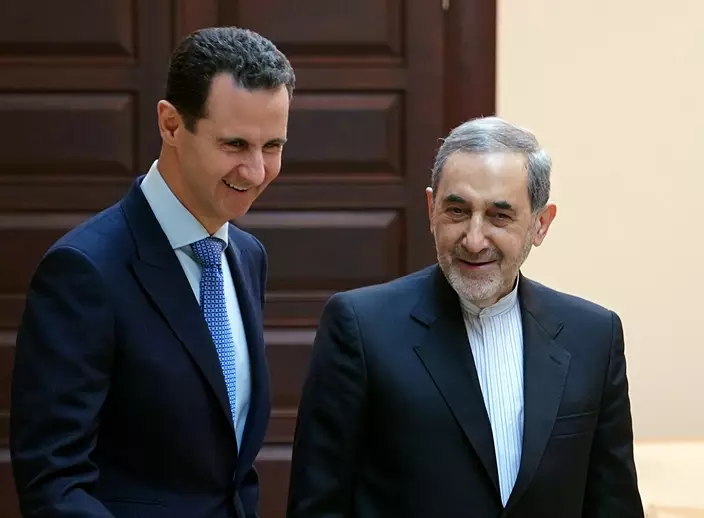
In this photo released by the Syrian official news agency SANA, Syrian president Bashar Assad, left, meets with Ali Akbar Velayati, an adviser to Iran's Supreme Leader Ayatollah Ali Khamenei, in Damascus, Syria, Thursday, April 12, 2018. (SANA via AP)
The imminent arrival of the chemical weapons inspectors came as rebels in Douma surrendered their weapons and left the town for opposition-held areas in the north. Russia's military said Thursday that Douma was now under full control of the Syrian government after a Russian-mediated deal secured the evacuation of the rebels and thousands of civilians after it was recaptured by Syrian forces.
Douma and the sprawling eastern Ghouta region near the capital, Damascus, had been under rebel control since 2012 and was a thorn in the side of President Bashar Assad's government, threatening his seat of power with missiles and potential advances for years. The government's capture of Douma, the last town held by the rebels in eastern Ghouta, marked a major victory for Assad.
Residents in Damascus, who had lived on edge for years because of mortar shells lobbed from eastern Ghouta, celebrated the news. Vehicles carrying Syrian flags were seen driving from Damascus into Douma, chanting in support of the government.
"This is a victory for Syria and the allies of Syria," declared Abboud Mardini, a 38-year old merchant in Damascus. "Eastern Ghouta was the main source of ... terrorists who from there spread throughout Syria."
There was no official government announcement that Douma had been recaptured and no indication that Syrian forces had yet entered the town, where Russian military police were deployed to preserve the peace after an evacuation fraught with difficulties. A single government flag was raised, a war monitoring group said.
Hamza Bayraqdar, spokesman for Jaysh al-Islam, the main rebel group that once controlled Douma, said his fighters had all evacuated. They handed over their heavy and medium weapons, as well as maps of land mines and the tunnels they dug, according to Syrian state media.
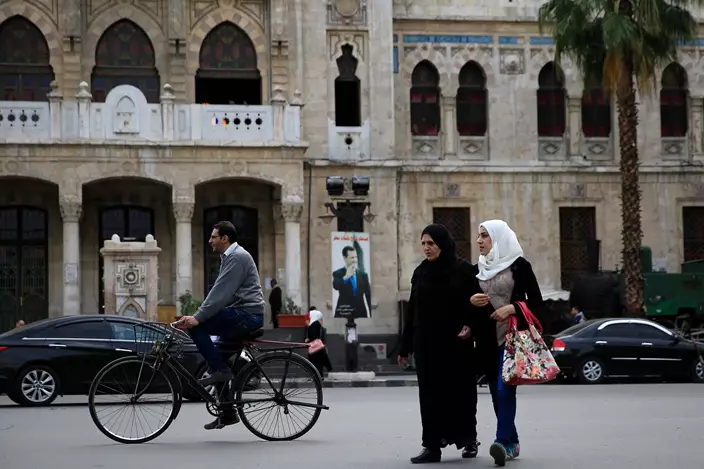
A man rides his bicycle past a banner showing Syrian President Bashar Assad in front the Ottoman-era Hijaz train station in the Syrian capital, Damascus, Syria, Thursday, April 12, 2018. The streets of Damascus were packed with people Thursday evening either going out to shop in one of the city's main markets to hanging out with families and friends at the capital's cafes, restaurants and sweets shops, people mostly appeared not concerned about a possible U.S. strike on the country going on with their lives as usual. (AP Photo/Hassan Ammar)
Douma and the rest of eastern Ghouta had been a significant rebel stronghold throughout Syria's civil war and its surrender came after years of siege by Assad's troops and a months-long military offensive. It followed weeks of negotiations mediated by Russia that repeatedly were derailed. A truce collapsed last week and the Syrian government pressed ahead with its military offensive.
Then came the suspected chemical attack in Douma, followed by international condemnation and threats of military action.
Amid conflicting tweets about the timing of any retaliation, President Donald Trump said Thursday that an attack on Syria could take place "very soon or not so soon at all." On Capitol Hill, U.S. Defense Secretary Jim Mattis said the National Security Council would be meeting later Thursday to present Trump with various options, adding that he could not talk about any military plans because an attack "is not yet in the offing."
Meanwhile, the British Cabinet on Thursday gave Prime Minister Theresa May the green light to work with the U.S. and France "to coordinate an international response," though it gave no indication of the timing or scale of any action.
President Emmanuel Macron said France had proof that the Syrian government had launched chlorine gas attacks in recent days, adding that his government would not tolerate "regimes that think everything is permitted," though he stopped short of saying whether France was planning military action.
In response to the threats, Assad said Thursday that a potential retaliation would be based on "lies" and would seek to undermine his forces' recent advances near Damascus. Western threats endanger international peace and security, Assad said, and military action would only contribute to the "further destabilization" of the region.
After the back-and-forth coming from Washington, Moscow and European Union capitals, residents in Damascus appeared to have brushed off the threat of an imminent attack.
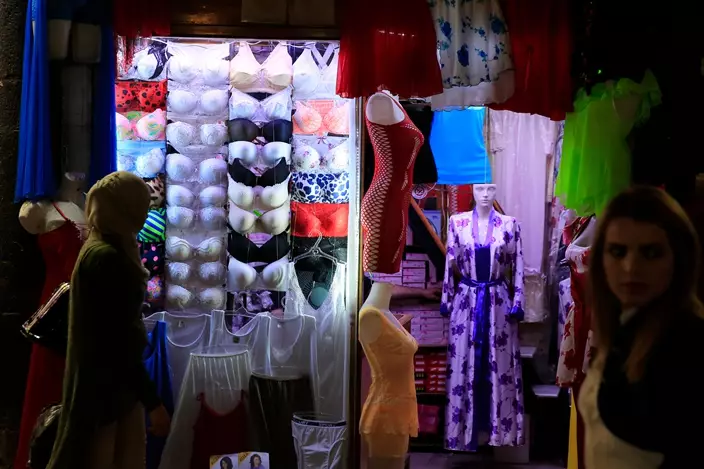
Syrians shop at the Hamadiyah market in the Old City of Damascus, Syria, Thursday, April 12, 2018. The streets of Damascus were packed with people Thursday evening either going out to shop in one of the city's main markets to hanging out with families and friends at the capital's cafes, restaurants and sweets shops, people mostly appeared not concerned about a possible U.S. strike on the country going on with their lives as usual. (AP Photo/Hassan Ammar)
The streets of Damascus were packed Thursday with people headed to the city's main market, cafes and restaurants. At Nabil Nafiseh, one of Damascus's most famous sweets shops, men, women and children sat outdoors enjoying the evening breeze and nibbling on Arab sweets.
Some residents were defiant. Real estate agent Ahmad Abdul-Rahman said he had brought his wife and three sons from his hometown of Aleppo, where there are no significant military targets, to Damascus to be together in case of an attack.
"I came here to defy the dogs who are threatening Syria," the 43-year-old said. "We don't care about America nor America's strike and we don't care about America's allies. We were not scared in Aleppo and we are not scared in Damascus."
Rafah al-Okda, a 21-year-old nursing student at Damascus University, said she had not changed her routine following the threats.
"Syria is a strong country, but our allies Russia and Iran make us stronger," she said.
Ahmad al-Issa, 46, ruled out a U.S. airstrike, saying Trump has in the past threatened to wipe North Korea off the map, then ended up calling for a meeting with North Korean leader Kim Jong Un.
"Even if he (Trump) fires what he calls smart bombs, at us they will be stupid bombs because they will backfire on him and Syrians will be stronger," al-Issa said.
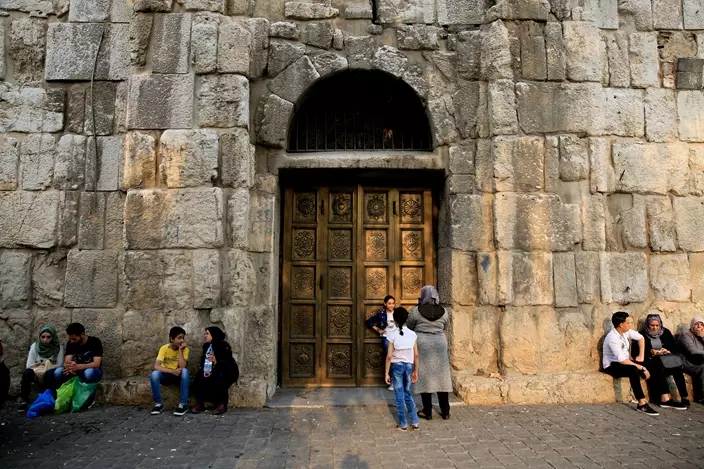
A woman takes a picture of her daughter in front the 7th century Umayyad Mosque in Damascus, Syria, Thursday, April 12, 2018. The streets of Damascus were packed with people Thursday evening either going out to shop in one of the city's main markets to hanging out with families and friends at the capital's cafes, restaurants and sweets shops, people mostly appeared not concerned about a possible U.S. strike on the country going on with their lives as usual. (AP Photo/Hassan Ammar)



